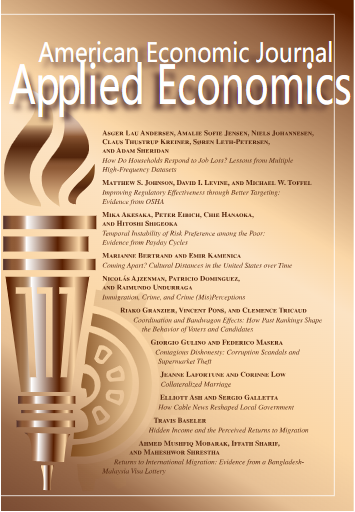形成经验和汽油价格
IF 6.2
1区 经济学
Q1 ECONOMICS
引用次数: 0
摘要
形成性经历会在几十年内塑造行为。我们记录了在20世纪70年代石油危机期间达到驾车年龄的人的一个显著特征——他们在2000年开车的次数减少了。这种影响并不局限于这些人群;不同时期和不同州的汽油价格变化表明,15-18岁年龄段的汽油价格变化通常会改变以后的出行行为。这种影响不能用经济衰退、收入或昂贵的技能习得来解释,也与近因偏见、心理可塑性和标准习惯形成模型不一致。相反,它们可能反映了驾驶偏好的形成或感知成本的持续变化。(jel d12, d91, l71, q35, r41)本文章由计算机程序翻译,如有差异,请以英文原文为准。
Formative Experiences and the Price of Gasoline
Formative experiences shape behavior for decades. We document a striking feature about those who came of driving age during the oil crises of the 1970s—they drive less in the year 2000. The effect is not specific to these cohorts; price variation over time and across states indicates that gasoline price changes between ages 15–18 generally shift later-life travel behavior. Effects are not explained by recessions, income, or costly skill acquisition and are inconsistent with recency bias, mental plasticity, and standard habit-formation models. Instead, they likely reflect formation of preferences for driving or persistent changes in its perceived cost. (JEL D12, D91, L71, Q35, R41)
求助全文
通过发布文献求助,成功后即可免费获取论文全文。
去求助
来源期刊

American Economic Journal-Applied Economics
ECONOMICS-
CiteScore
9.10
自引率
1.60%
发文量
63
期刊介绍:
American Economic Journal: Applied Economics publishes papers covering a range of topics in applied economics, with a focus on empirical microeconomic issues. In particular, we welcome papers on labor economics, development microeconomics, health, education, demography, empirical corporate finance, empirical studies of trade, and empirical behavioral economics.
 求助内容:
求助内容: 应助结果提醒方式:
应助结果提醒方式:


